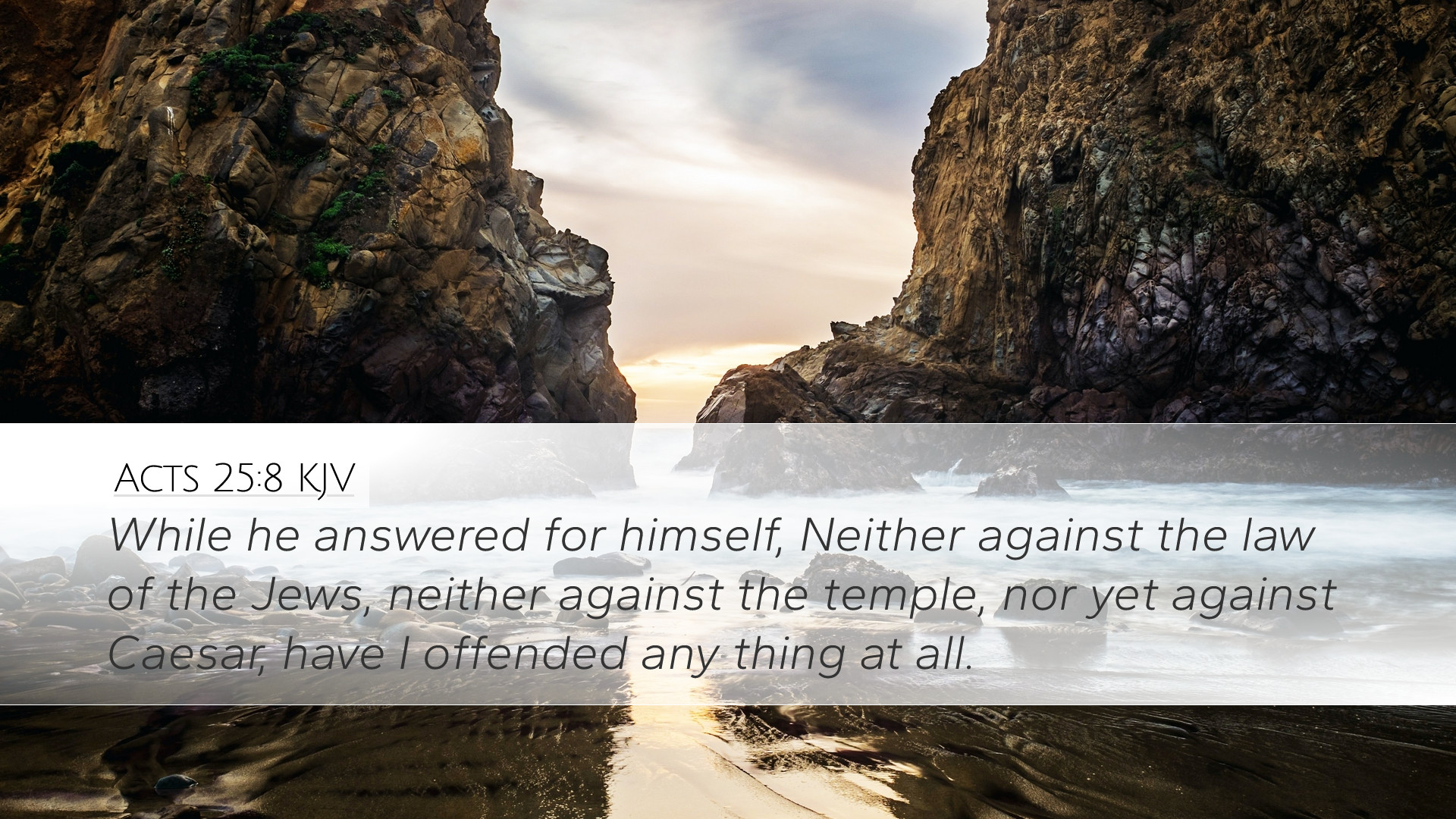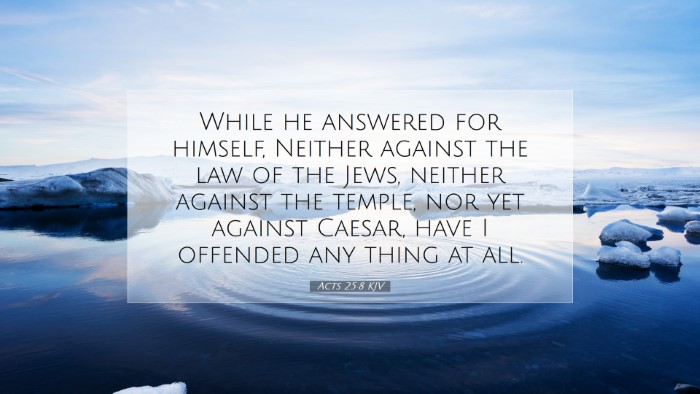Old Testament
Genesis Exodus Leviticus Numbers Deuteronomy Joshua Judges Ruth 1 Samuel 2 Samuel 1 Kings 2 Kings 1 Chronicles 2 Chronicles Ezra Nehemiah Esther Job Psalms Proverbs Ecclesiastes Song of Solomon Isaiah Jeremiah Lamentations Ezekiel Daniel Hosea Joel Amos Obadiah Jonah Micah Nahum Habakkuk Zephaniah Haggai Zechariah MalachiActs 25:8
Acts 25:8 KJV
While he answered for himself, Neither against the law of the Jews, neither against the temple, nor yet against Caesar, have I offended any thing at all.
Acts 25:8 Bible Commentary
Commentary on Acts 25:8
Acts 25:8 states, "While he answered for himself, Neither against the law of the Jews, neither against the temple, nor yet against Caesar, have I offended anything at all."
Introduction
This verse marks a crucial moment in the continued defense of Paul as he stands trial before Festus. The integrity of Paul's defense is evident as he addresses the accusations laid against him. In this commentary, we will explore the insights from notable public domain commentators including Matthew Henry, Albert Barnes, and Adam Clarke.
Context of Acts 25
In Acts 25, we see Paul navigating the complex political and religious landscape of first-century Judea. After his imprisonment, he faces new charges brought forth by the Jewish leaders. The context emphasizes the conflict between Jewish law and Roman governance, highlighting Paul's unique position as a Roman citizen and a devoted Jew.
Paul's Defense
In his defense, Paul explicitly states three areas where he claims to be innocent:
- Against the Law of the Jews: Paul asserts that he has not transgressed the Mosaic Law, which is likely intended to assure both the Jewish audience and the Roman authorities of his fidelity to Jewish customs.
- Against the Temple: The accusation of having defiled the Temple is nullified by his affirmation of respect for Jewish worship practices.
- Against Caesar: This claim reinforces his loyalty to the Roman Empire, indicating that he has not undermined imperial authority.
Insights from Matthew Henry
Matthew Henry emphasizes that Paul’s defense reflects not only his innocence but also his diplomatic skill. Henry notes:
"Paul, in defending himself, carefully avoids antagonizing the Jewish authorities, while unequivocally declaring his allegiance to the Law and to Caesar, reminding us of the importance of tact in witnessing for the truth."
Henry also highlights the significance of Paul’s calm demeanor during this tumultuous time, suggesting that his poise under trial serves as a model for believers facing persecution.
Insights from Albert Barnes
Albert Barnes provides a detailed analysis of the political climate surrounding Paul's trial. He notes:
"Paul's expression here shows a sophisticated understanding of the charges leveled against him, which were politically motivated rather than truly religious. His defense plays into the judicial and social dynamics at play, highlighting the cleverness of his argument."
Barnes further discusses the implications of Paul’s statement regarding Caesar, explaining that this deflection serves both legal purposes and demonstrates Paul's commitment to peace and order within the Roman system.
Insights from Adam Clarke
Adam Clarke delves into the theological implications of Paul’s statements. He remarks:
"By affirming his innocence in regard to the Law, the Temple, and Caesar, Paul effectively elevates the discussion from mere legality to a matter of personal faith and integrity. His arguments rest on the foundation of truth, not simply legal loopholes."
Clarke also points out that Paul articulates a defense that reflects his understanding of the Gospel, where genuine faith cannot coexist with wrongful conduct. This distinction empowers believers to stand firm in their convictions while navigating secular authorities.
Theological Implications
Acts 25:8 raises important theological themes, particularly concerning the relationship between faith and law. The verse illustrates that:
- Christians are called to be law-abiding citizens: Paul’s approach reinforces the idea that Christian faith does not lead to lawlessness but should inspire believers to uphold the law wherever possible.
- The Kingdom of God and earthly authority: This passage also encourages reflection on how believers relate to civil authorities, as Paul acknowledges the significance of Caesar while remaining obedient to God’s higher laws.
- Integrity in testimony: Paul’s defense teaches that maintaining integrity in one’s public and private life is essential, particularly when faced with opposition.
Conclusion
Acts 25:8 serves as a powerful reminder of the need for integrity, tact, and loyalty in the life of a believer. Commentators like Henry, Barnes, and Clarke provide valuable insights that enrich our understanding of this verse, illustrating how Paul navigated the complexities of his situation with wisdom and faithfulness. As pastors, students, and theologians reflect on this passage, they are encouraged to consider the broader implications of their own testimonies in relation to the world around them.


